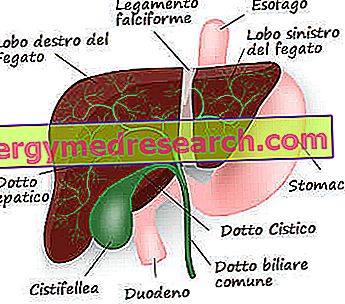Generality
The air in the stomach is a disorder of the digestive system that occurs due to the excessive ingestion of gas, the introduction of food, or the frequent swallowing of saliva.

This problem recognizes both physiological and pathological causes. The air in the stomach is often the consequence of bad eating habits, such as the tendency to eat the meal too hastily. Anxiety and smoking habits can also promote the problem. However, the increase in the air content in the stomach may be due to other causes, such as diseases of the stomach or other abdominal organs (eg hiatal hernia, gastritis, peptic ulcer, pancreatitis and irritable bowel syndrome).
The air in the stomach is generally followed by abdominal bloating, gastric tension, frequent belching and flatulence.
The treatment of air in the stomach varies according to the triggering condition. In any case, the evaluation and advice of a doctor is useful to find the most suitable solution.
What's this
The air in the stomach is a condition that occurs due to the ingestion of large amounts of gas . Often, the increase in air content in the stomach is the result of bad eating habits (like eating hastily, chewing little and badly or talking).
The problem also commonly affects anxious people, who tend to swallow unknowingly more frequently. Smoking is also an opportunity to ingest air, in addition to cigarette fumes.
The air in the stomach can also depend on pathological conditions that mainly involve the gastrointestinal system.
Note
When air accumulates in the stomach it speaks of aerophagia, while the presence of gas in the intestine is called meteorism .
Causes
The air in the stomach is a manifestation caused by the excessive ingestion of gas. This phenomenon can be physiological or may depend on a pathological condition .
Air in the Stomach: Normal situation
Within certain limits, the air in the stomach is a completely normal phenomenon, which occurs involuntarily when talking and while eating or drinking.
Normally, the air present in the intestine comes mostly from chewing and swallowing (about 70%), while to a lesser extent it comes from the bloodstream (20%) and from the bacterial fermentation of undigested organic residues (10% ).
The elimination of air in the excess stomach occurs with various mechanisms, including: blood reabsorption, belching and flatulence . Therefore, the air in the stomach is often a cause of meteorism .
An excessive amount of air in the stomach can accumulate due to the habit of eating quickly ( tachyhagy ), chewing little or talking : in addition to the morsels of food, excessive quantities of air are ingested as well.
The air in the stomach may be associated with the habitual and excessive use of carbonated drinks, chewing gum, leavened products and fermented cheeses.
Air in the Stomach: Pathological Conditions
When it is not physiological, the air in the stomach takes on pathological characteristics.
The conditions associated with this event are numerous and include:
- Organic diseases affecting the digestive tract:
- Hiatal hernia;
- Gastritis;
- Pancreatitis;
- Inflammation of the liver (hepatitis);
- Peptic ulcer;
- gastroduodenitis;
- Cholecystopathies (gallstones, cholecystitis, cholangitis, cirrhosis, etc.);
- Inflammatory bowel disease, including irritable bowel syndrome, ulcerative colitis and Crohn's disease;
- Malabsorption syndromes, such as celiac disease (or celiac disease).
- Disorders of the psychic sphere (anxious states, emotional tension, nervousness etc.);
- Extra-intestinal disorders:
- Ovarian cancer.
A pathological increase in the air in the stomach can also occur in conditions characterized by xerostomia (dry mouth) or sialorrhoea (abundant salivation) which lead to swallowing more frequently. In some diseases of the respiratory tract, such as rhinitis and chronic sinusitis, the swallowing of considerable amounts of saliva can predispose to the onset of the disorder. For the same reason, the air in the stomach can also be favored by the use of inadequate dental prostheses or by smoking . In fact, these situations involve an increase in the salivation and ingestion of the air bubbles normally present in the saliva.
Even anxiety during the meal, related to an emotion or a state of discomfort, can favor the ingestion of air in the stomach, as we tend to eat with an open mouth, chewing quickly and badly.
Symptoms and Complications
In most cases, the air in the stomach manifests itself in combination with various symptoms, such as:
- Sense of fullness and stomach swelling ;
- Abdominal tension and swelling ;
- Borborigmi (gurgles due to the movement of gases in the intestine).
People who have a tendency to accumulate air in the stomach may also experience heart rhythm disturbances ( palpitations ) and feelings of breathlessness .
In some cases, then, it is possible the appearance of a retrosternal pain, difficult to distinguish from the anginal attack (note: the onset of a sense of thoracic oppression can be wrongly interpreted as a myocardial infarction).
In anxious patients with reduced gastric extension tolerance, the air in the stomach can determine:
- Acute dilation of the stomach;
- Sense of suffocation;
- Tachycardia;
- hyperventilation;
- Nausea.
Possible consequences
The air accumulated in the stomach is re-ejected through burping or will cause flatulence and meteorism .
Diagnosis
When the air in the stomach is a troublesome, continuous manifestation (lasting for more than a couple of days) or recurrent (ie episodes of malaise are repeated frequently, alternating with periods of well-being), it is advisable to consult your doctor or gastroenterologist, for a careful evaluation.
The diagnostic procedure involves, first of all, the collection of the patient's medical history ( anamnesis ) and the objective examination, in association with blood, urine and faeces analysis, to highlight a malabsorption problem (eg celiac disease or Crohn's disease) or check liver function.
In case of doubt, an ultrasound examination of the abdomen may be required.
To establish the responsible causes of air in the stomach and prescribe the appropriate therapy, the doctor can also indicate the execution of:
- Esophagogastroduodenoscopy (EGDS) : endoscopic examination that allows the visualization of the inside of the esophagus, stomach and duodenum;
- Colonoscopy : examination indicated above all in the presence of concomitant diarrhea and increasing weight loss; the coloncopia allows to examine the inside of the colon, identifying polyps or cancerous lesions;
- CT or MRI : imaging studies, useful for highlighting some neoplastic lesions.
Treatment and Remedies
As for the treatment, the options vary depending on the cause of the air in the stomach. When the disorder has no pathological origin, but occurs sporadically and depends on lifestyle, bad eating habits or wrong behavior, it should not be a cause for concern. In these cases, it is not necessary to resort to special care, but it is important to correct the habits that predispose the air in the stomach.
To avoid swallowing air, the most appropriate measure is to not eat your meals hastily, dedicating the appropriate time to chewing. Other useful remedies consist in limiting the conversation at the table, in order not to swallow continuously and swallow "morsels of air". The foods that should be limiting in the case of stomach air are the most common gas vehicles, such as leavened products and fermented cheeses.
If the air in the stomach is a disorder that always manifests itself with the same characteristics and is a chronic malaise, it is advisable, first of all, to avoid the consumption of carbonated beverages and to eat slowly to reduce the ingestion of gas. At the same time, your doctor may recommend taking medicines or food supplements that prevent the formation of air in the gastrointestinal tract.
Acute episodes that occur in severe form can be treated, always with the doctor's advice, with the use of drugs, such as sedatives to reduce the ingestion of air, adsorbent substances (vegetable carbon) and prokinetics.
In the case of air in the stomach secondary to another disease, however, the therapy is based on the management of the latter. These pathological conditions require targeted treatments for their solution.



